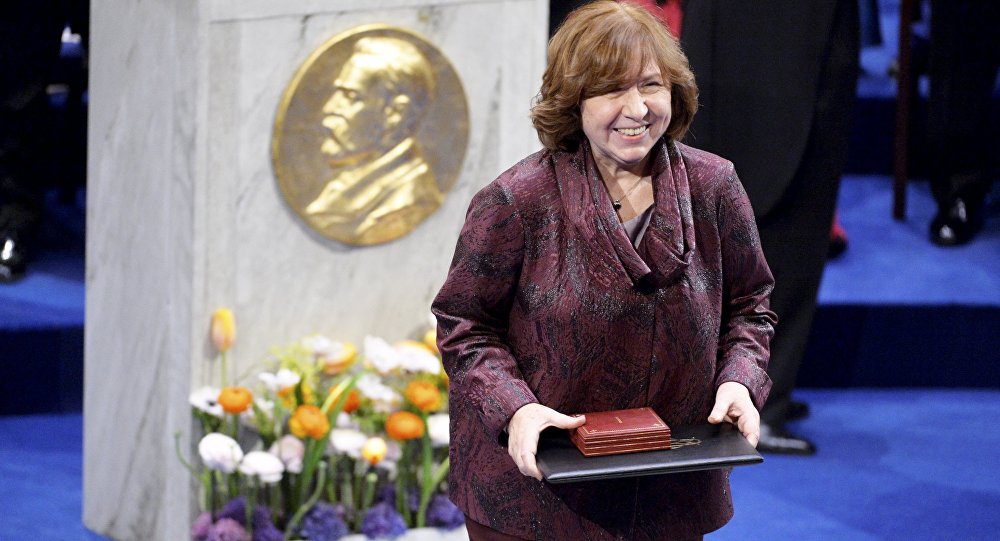
Belarus’ Nobel Prize Winner and Her Country Defy Clichés
Publication: Eurasia Daily Monitor Volume: 12 Issue: 225
By:

On December 7, Belarusian writer Svetlana Alexievich, the winner of the 2015 Nobel Prize in literature, gave her Nobel lecture in Stockholm (Naviny.by, December 7). The lecture was delivered in Russian, the language in which Alexievich writes. In it, she first dwelled on her post–World War II experiences reflected in her most famous non-fiction book, War’s Unwomanly Face (1985). Born three years after the end of the war in western Ukraine, Alexievich soon moved with her family to Belarus, and later she became absorbed by the horrors of the rural Belarusian women’s war-time memories. In her speech, she also dwelled on the 1986 Chernobyl nuclear meltdown ordeal as perceived by the women on both sides of Belarusian-Ukrainian borderland and reflected in her book, Voices from Chernobyl (1999).
Most of her forty-minute lecture, however, was devoted to the tragedy of the so-called “red man,” i.e., a person engrossed by the communist utopia and unable to come to terms with ensuing reality. Alexievich’s last (2013) book, Second-Hand Time: The End of the Red Man, is entirely about this misfortune (see EDM, September 25, 2013). “My father died recently,” Alexievich said, “He believed in Communism to the end. He kept his party membership card. I cannot bring myself to use the word ‘sovok,’ that derogatory epithet for the Soviet mentality, because then I would have to apply it my father and others close to me, my friends.” She added later, “I am drawn to that small space called a human being […] a single individual. In reality, that is where everything happens” (Nobelprize.org, December 7).
Alexievich’s assurance that “everything happens” not so much in a top-down fashion, through ideological indoctrination, as through a tenacious redistributive grassroots mentality making it to the helm of power, is perhaps the most important message of her journalistic and literary work, a message that some Western political scientists have had a difficult time absorbing. Without it, however, one would never grasp why it is that according to an arch-typical red man’s confession, “the only time we were free was during the war, at the front. Suffering is our capital, our natural resource… It is the only thing we are able to produce consistently.” Alexievich has been steadfastly looking for the answer: “Why does our suffering not convert into freedom? Is it truly all in vain? [Pyotr] Chaadayev [a reference to a Russian philosopher, 1794–1856] was right: Russia is a country without memory, it is a space of total amnesia, a virgin consciousness for criticism and reflection” (Nobelprize.org, December 7).
In Russia, only liberals applauded Alexievich. National patriots castigated her for her anti-Kremlin stand vis-à-vis the war in Ukraine and a generally dark view of Russia. Even Alexievich’s repeated confessions that she is a product of Great Russian culture did not impress them. According to Victor Dyatlikovich, a Moscow-based journalist and an ethnic Belarusian, this reaction paralleled that of a common Hungarian reaction to Imre Kertész receiving the 2002 Nobel Prize in literature. For years, Hungarian journalists and literati had asked when, if at all, a Hungarian author would receive that honor. But when Kertész actually did, the eternal question was altered: When will a true Hungarian (Kertész is a Jew) receive the Nobel Prize? (Svaboda.org, December 13).
But it is the reaction in Belarus to Alexievich’s award that has been most intriguing. Whereas some Belarusians are cheering if only because her award puts Belarus on the map, quite a few self-proclaimed patriots accuse Alexievich of Russianness and cosmopolitanism. For these critics, Alexievich is “not one of us.” In her lecture, she did not talk about Belarus and its alleged struggle with its “tyrannical regime”; she only somewhat made up for that omission in her speech at the Nobel banquet. At the same time, the Belarusian “regime” itself has exercised detachment and restraint because Alexievich, after all, had previously criticized President Alyaksandr Lukashenka on many occasions. Alexander Klaskovsky, himself a veteran opposition columnist, lambastes Alexievich’s critics from the ranks of the opposition for being effectively too “Bolshevik” in their approach and for retiring to some kind of ivory tower. From this safe, close-knit circle of their friends, Klaskovsky argues, these opposition activists “fight” the regime instead of treating Belarus as their own country for which they should fight openly, in real life, not on the Internet. Moreover, Klaskovsky thinks that Alexievich’s critics bear an imprint of a “red man” no less indelible than those who are indeed nostalgic for Soviet times. That Alexievich does not fit the mental clichés held by virtually any ideological camps is rather an affirmation of her quality as a writer, Klaskovsky concludes (Naviny.by, December 8).
That clichés regarding Belarus are increasingly heedless or outmoded has also recently been reconfirmed on the international stage. On December 14, Belarus’s Foreign Minister Vladimir Makei visited Brussels and met with the ministers of foreign affairs of the European Union member states. He also had a meeting with High Representative of the European Union for Foreign Affairs and Security Policy Federica Mogherini, Commissioner for European Neighborhood Policy and Enlargement Negotiations Johannes Hahn and, most unexpectedly, with Alexander Vershbow, the Deputy Secretary-General of the North Atlantic Treaty Organization (NATO). The talks focused on current issues of cooperation between Belarus and the EU and NATO (Mfa.gov.by, December 14). In addition to assuming a more cooperative posture with the West, Belarus has also continued seeking an international mediator’s role. Thus, while speaking in Ashgabat, Turkmenistan, on December 12, Lukashenka called upon both Russia and Turkey to “cease inflaming passions and make half a step toward each other” so that the conflict could be resolved (Belta, December 12).
By all indications, many developments involving Belarus that, until just recently, were thought of as impossible or extraordinary, are now more and more becoming quite casual. And this reality promises to have important strategic implications for Belarus and wider Europe itself.




